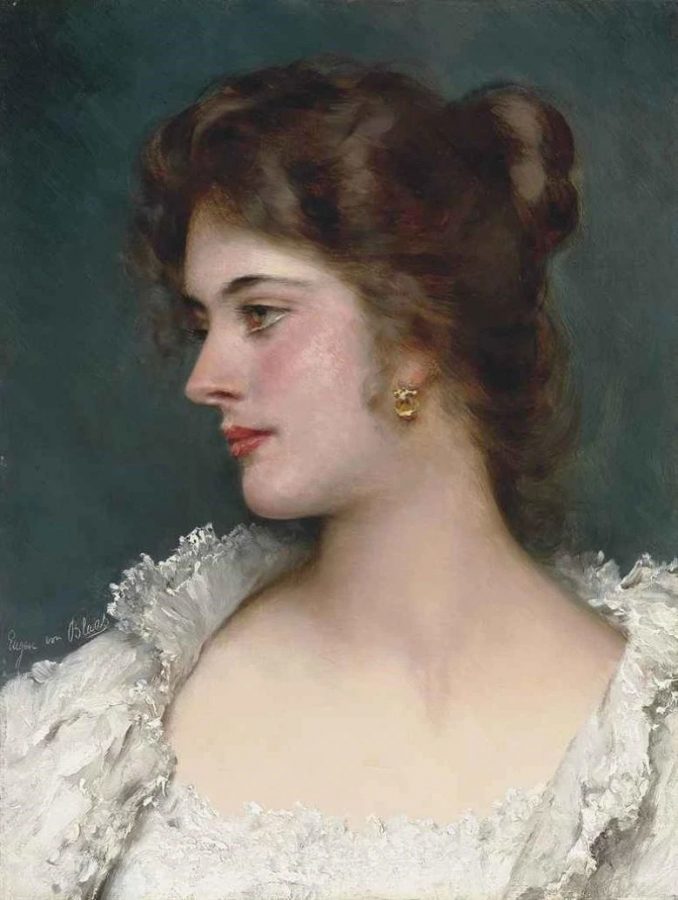Society’s Role in Defining Perfection
Why can’t imperfections be perfect?
Eugene de Blaas [Public domain] via Wikimedia Commons
Many artists, like Eugene de Blaas, painted portraits of what was considered to be classic beauty in the 19th century, as seen in this oil painting of “A Young Beauty.”
People who are beautiful have more opportunities. Studies support this. But since most people are average, many try to change the way they look.
Many studies show that overweight people get less job opportunities and more athletic people get more. Attractive people get more opportunities, which just fuels the sales of products and treatments to cover imperfections.
Societal pressures often cause many women to get liposuction, develop eating disorders due to dieting, and they harm themselves with enhancements. All these methods prove to be dangerous. Since society has standards of beauty that are close to unachievable, many people hurt themselves in the name of beauty.
Different cultures have different standards of beauty, which can shape the way people see themselves and how they see others. Colorism, or discrimination within a racial or ethnic group favoring people with lighter skin over those with darker skin, is a serious issue, especially in countries where skin-whitening products are sold.
Many skin-whitening products contain mercury, which could cause kidney damage. It could also cause skin-discoloration, rashes, could make the skin more susceptible to bacterial and fungal infection and scars. Mercury could also affect mental health. It could cause anxiety, depression, or psychosis and peripheral neuropathy (a condition that results when nerves that carry messages to and from the brain are damaged). All of this could be because of using skin-whitening creams regularly.
In many countries the amount of mercury one can put into a product is regulated, or it is illegal to use mercury in creams and lotions.
According to NextShark, a leading source covering Asian American and Asian news, “In China, Japan and Korea – long before exposure to European beauty standards – tan skin was associated with lower-class field work while having pale skin signified social prestige.” Many women in Asia use creams and are very covered during sunny days.
Women should not be pressured to use dangerous creams and products to whiten their skin. Skin tone is an unchangeable part of someone, and a person shouldn’t be bullied for that.
Another problem with mercury-based products is it damages the environment. If mercury is in soaps and creams, it transfers into wastewater. When it enters the environment, it becomes methylated and enters food chains, which causes the methylmercury in fish (which is highly toxic). Many pregnant women do not consume fish because of this, if they consume methylmercury it could cause damage to the fetus.
Many makeup products, creams, and soaps are unfortunately tested on animals. This could hurt the animals, which are kept in bad conditions in the first place. According to the Humane Society International, “approximately 100,000-200,000 animals suffer and die just for cosmetics every year around the world. These are rabbits, guinea pigs, hamsters, rats and mice.” The risk is greater than the reward when dealing with makeup that is detrimental to your health and the environment.
There are alternatives, because some makeups do not contain mercury or harmful chemicals. These are safer to use. However, many natural beauty products are more expensive than chemically produced ones.
Beauty standards should not make you question yourself. Everyone is beautiful in their own way, and society should not deem what is beautiful and what is not. Instead of making everything fit into a standard of what is labeled as “perfection,” we should try to understand the beauty of being unique.

Iris Higier joined the Green Wave Gazette her freshman year because she was interested in journalism. She is part of the Class of 2023 and hopes to be...


Anna • Jan 22, 2020 at 12:03 PM
This article really sheds light on a serious real world issue that no one really talks about. Great job Iris!